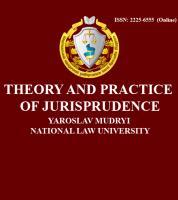Author(s): Andrii Olefir / Language(s): Ukrainian
Issue: 129/2015
Problem setting. In a market economy and increased competition between enterprises become increasingly important concepts such as business information, trade secrets, know-how, confidential information, the information with restricted access. Given the fact that only one patent protection is unable to meet the needs of researchers, in addition to formal public protection and secured legal means we would like to pay attention at private legal measures, particular, the mode of trade secrets.Recent research and publications analysis. Different aspects of the protection of trade secrets were investigated by specialists such as G. Androschuk, J. Berzhye, I. Davydov, O. Davydyuk, D. Zadyhaylo, P. Kraynov, G. Nikiforov, S. Nikiforov, V. Rubanov, E. Solovyov, L. Hoffman, V. Chaplygin, A. Cherniavsky and others. However, at present there is a lack of comprehensive research of this legal phenomenon, equally useful for innovators and businesses that actively protect corporate security.Paper objective. This article is planned to determine the legal characteristics, structural elements and mechanisms by which the use of trade secrets in business have a positive impact on innovation development and corporate security entities.Paper main body. On the basis of requirements of Art. 505 Civil Code of Ukraine and art. 39 of the TRIPS Agreement we formulated commercial information signs under which it receives legal protection as an object of intellectual property: (1) privacy (real or potential) in the sense that it is as a whole or in a precise combination of aggregate and its components are not generally known or available to persons in the circles that normally deal with such information; (2) commercial value (not purely industrial or industrial), due to its secrecy; this information is unknown to others, which is a commercial interest; (3) the lawful holder of the information provides active special measures (technical, organizational, legal) to preserve secrecy. The objects of trade secrets, depending on the fields may be the following types of information: (1) scientific and technical; (2) management; (3) commercial; (4) financial.At this stage, there is a growing role of know-how, compared with patents, because as their special advantages and drop interest in patenting innovations as an independent factor, as well as economic and legal efficiency mode of trade secrets. Under the know-how necessary to understand the technical, manufacturing, engineering knowledge, experience and skills related to the design, development, manufacture, sale, operation, maintenance, repair, improve technology and other innovative objects which have the status of trade secrets, and a factor of competitiveness entity.Given the fact that the administrative and jurisdictional mechanisms for the protection of trade secrets are more or less clear, we focused on internal corporate events. First, this is consolidation in the basic documents of the entity (statute, founding and collective agreements, work rules on trade secret law) such provision as law on ownership and protection of trade secrets. Second, the order of the head of the entity to approve the list of information to be protected as a trade secret. Third, develop and adopt regulations on trade secrets. Fourth, to approve the regulations on the organization of the documents containing trade secrets. Fifth, to include in a labor agreement (contract) the condition of non-disclosure of trade secrets or employee expected signing of enhancing privacy protection.Conclusions of the research. In order to stimulate innovation growth and protection of corporate security entities we should propose changes to the legislation: (1) secure the definition of the concept of «know-how (secret production)» indicating that the exclusive right to the secret of acting as long as the relation of production secrets operating mode of trade secrets; (2) add Tax Code of Ukraine following types of tax benefits: (a) exemption of small businesses from paying value added goods produced using in-house production know-how (secrets), sold small businesses within the term of exclusive rights to these intellectual activities, but not more than 5 years; (B) exemption of small businesses from paying income tax amounts in the form of sales of products derived from the use of know-how (secrets) in-house production from the beginning of their use, within the term of the exclusive rights to these intellectual activities, but not more than 5 years; (3) adopt by the Cabinet of Ministers exemplary (typical) provision of trade secrets in business organizations, which determine the general procedure for the use of legal, organizational and technical means to ensure the confidentiality of trade secrets.
More...




